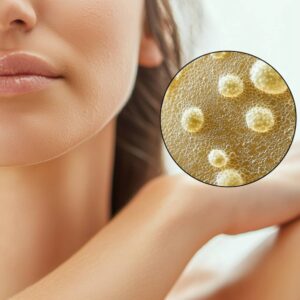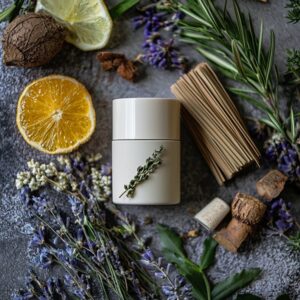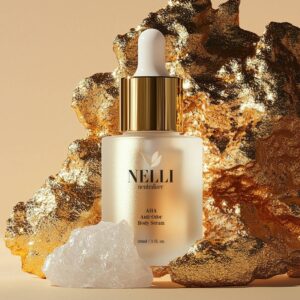
Natural deodorants. The phrase conjures up dreamy marketing images of wildflowers, mason jars, and promises of a “chemical-free” utopia. But here’s the not-so-sweet truth: just because something is “natural” doesn’t mean it’s better. In fact, many natural deodorants fail miserably when it comes to doing the one job they’re meant to do—stopping the funk.
If you’ve ever sniffed your armpits at 3 p.m. after using a natural deodorant and thought, “Oh no, this is me now,” you’re not alone. I’ve been there too. So, let’s unpack why natural deodorants often miss the mark and why science-backed alternatives, like Nelli Neutralizer Anti-Odor Serum, are the unsung heroes of odor control.
Table of Contents
The Natural Deodorant Myth: Sweat and Regret
The allure of natural deodorants is understandable. Who wouldn’t want to believe that dabbing some coconut oil or sprinkling baking soda on your pits can keep you fresh and save the planet? But let’s get real—there’s a big difference between smelling like a meadow and actually staying odor-free after a spin class.
Sweat itself isn’t the problem; it’s odorless. The real culprit? Bacteria. When sweat mixes with bacteria on your skin, they throw a party, breaking down sweat molecules into smelly byproducts. Natural deodorants often ignore this fact, opting instead for “masking” odors with essential oils or absorbing sweat with powders. Spoiler alert: that’s like putting a Band-Aid on a broken pipe—it doesn’t fix the source of the problem.

The Problem with Natural Deodorants
Let’s talk about the love-hate relationship many of us have with natural deodorants. They promise the world—fresh pits, zero chemicals, and a guilt-free conscience—but the reality often smells… well, not so great. Let’s break down why natural deodorants often fall short and why we need to rethink the hype.
Sweat vs. Odor: Let’s Get It Straight
First things first: sweating isn’t the enemy. If you’re blaming sweat for bad smells, you’ve been misled. Sweat itself is odorless; the real culprit is bacteria. When sweat meets bacteria on your skin, it’s a recipe for odor. Think of it like a potluck—you bring the sweat, bacteria bring their enzymes, and together, they cook up some seriously funky smells.
Natural deodorants? They often just slap a floral-scented bandage on the problem. Sure, you might smell like a lavender farm for an hour, but without the right ingredients to tackle those odor-causing bacteria, it’s only a matter of time before things take a turn for the worse.
“Natural” Isn’t Always “Gentle”
Here’s a truth bomb: just because something is natural doesn’t mean it’s gentle. In fact, some natural deodorant ingredients can be downright brutal on your skin.
Take baking soda, for example. It’s a popular choice in natural deodorants because it absorbs odors, but it’s also highly alkaline. This can throw your skin’s pH off balance, leading to irritation, redness, and even those dreaded underarm rashes. Not exactly the soothing, earth-friendly experience you signed up for, right?
And let’s not forget essential oils. They sound so pure and harmless, but in reality, they can be potent allergens, especially for sensitive underarm skin. Sure, they smell divine, but at what cost? A patch of angry, inflamed skin? No, thank you.
The Unpredictable Nature of Natural
Let’s be honest: natural deodorants are wildly inconsistent. One day they work like a charm, and the next, it’s like you didn’t put anything on at all. Why? Because their effectiveness depends on too many variables—your activity level, the weather, your diet, even your body chemistry.
Ever found yourself awkwardly reapplying deodorant halfway through the day, praying no one notices? That’s the hallmark of a product that just can’t keep up. Natural ingredients can be finicky, and without the stability provided by lab-tested formulations, they’re unreliable at best.
Where’s the Clinical Backing?
One of the biggest issues with natural deodorants is their lack of clinical research. While science-backed products are rigorously tested for efficacy and safety, many natural deodorants skip this step entirely. Instead, they rely on trendy buzzwords and pretty packaging to sell the dream.
The result? A lot of disappointed users wondering why they smell like a campfire instead of chamomile. Without clinical validation, you’re essentially playing trial-and-error with your pits—and who has time for that?
When “Natural” Gets Weird
Let’s take a moment to talk about some of the more, uh, “creative” natural deodorant hacks out there. I once read about someone using lemon juice as a deodorant. Lemon juice. On skin. In the sun. I don’t know who needs to hear this, but if you want your armpits to smell good, giving yourself a chemical burn isn’t the way to go.

Then there’s the baking soda debacle. While baking soda can absorb odors, it’s also alkaline, meaning it can disrupt your skin’s natural pH and leave you with irritated, itchy pits. Sure, it’s natural—but so is poison ivy, and you’re not rubbing that under your arms, are you?
Other “Natural” Myths Busted
The deodorant aisle isn’t the only place where the “natural is better” myth runs wild. Let’s call out a few other examples:
- “Natural preservatives” aren’t always safer. Many natural preservatives, like grapefruit seed extract, are ineffective at preventing microbial growth. In contrast, synthetic preservatives like phenoxyethanol are proven to keep products safe without risking contamination.
- Natural doesn’t mean allergy-free. Poison ivy is natural. So is latex. Both can wreak havoc on sensitive skin.
- Plant extracts can be unstable. Ingredients like Vitamin C are notoriously finicky and lose their effectiveness when exposed to air or light. Lab-stabilized versions (like ascorbic acid derivatives) solve this problem, delivering consistent results.
Why Science-Backed Deodorants Are Superior
Here’s where the magic of science comes in. Unlike natural deodorants, scientifically formulated products don’t rely on wishful thinking. They’re developed with research, clinical testing, and actual evidence that they work.
For example:
- They Target Bacteria: Science-backed deodorants use ingredients like antimicrobial agents to neutralize odor-causing bacteria before they can wreak havoc.
- They’re Stable and Reliable: Unlike some natural products that vary wildly in effectiveness, lab-formulated deodorants are designed to perform consistently.
- Gentle Meets Effective: Modern formulations often prioritize skin health, meaning you don’t have to choose between irritation and odor control.
Take the Nelli Neutralizer Anti-Odor Serum. It’s aluminum-free, sweat-friendly, and specifically designed to neutralize odor-causing bacteria while being gentle on your skin. No gimmicks. Just science.
The Aluminum-Free Hype: Do You Really Need It?
One of the biggest selling points of natural deodorants is that they’re aluminum-free. And while it’s true that some people prefer to avoid aluminum-based antiperspirants, let’s clear something up: aluminum isn’t the villain it’s been made out to be.
Aluminum works by temporarily blocking sweat glands, reducing moisture and, in turn, odor. The controversy around aluminum has largely been debunked by scientific studies, but if you’re still not into the idea, there’s good news. Products like the Nelli Neutralizer Anti-Odor Serum offer effective odor control without aluminum. Instead of blocking sweat glands, they let you sweat naturally while keeping odor at bay.
The “Natural Is Better” Myth Debunked
It’s time we address the elephant in the room: the idea that “natural” is inherently better is one of the most pervasive myths in the beauty world. Sure, natural ingredients can be amazing. But they’re not automatically superior, safer, or more effective than their lab-created counterparts.
Let’s dive deeper into this myth and explore more examples where synthetic ingredients shine:
Synthetic Squalane: Nature Perfected
Squalane’s glow-up is legendary. Originally derived from shark liver oil, it’s now lab-created using sustainable plant sources like sugarcane. Synthetic squalane is:
- Safer and purer. It eliminates impurities found in animal-derived squalane.
- Sustainable. No harm to sharks or ecosystems.
- Consistent. Lab processes ensure every batch delivers the same silky, non-greasy hydration.
Lab-Engineered Peptides: Targeted Skincare Heroes
Natural extracts can only do so much. Peptides, on the other hand, are lab-designed to tackle specific skin concerns with precision:
- Wrinkles? Check. Peptides mimic collagen-building signals to smooth fine lines.
- Hyperpigmentation? Solved. They can reduce melanin production in overactive areas for even skin tone.
- Irritation? No problem. Peptides can calm inflammation without disrupting the skin barrier.
Retinol vs. Natural Vitamin A
Vitamin A derivatives are popular in both natural and synthetic forms, but retinol—a lab-engineered superstar—outshines natural sources like rosehip oil:
- More effective. Retinol penetrates deeper and stimulates collagen production for firmer, smoother skin.
- Stability. Synthetic retinol is stabilized to maintain potency, unlike natural vitamin A, which degrades quickly.
- Proven results. Retinol is backed by decades of clinical research, while natural alternatives often lack similar scientific validation.
Hyaluronic Acid: Nature Amplified
Hyaluronic acid is naturally found in our skin, but the synthetic version used in skincare products takes it to a whole new level:
- Customizable molecular weights. Lab-created hyaluronic acid can be tailored for deep hydration or surface plumping.
- More stable. Synthetic versions resist breakdown and last longer in formulas.
- Cruelty-free. Natural hyaluronic acid was once harvested from rooster combs (yes, really), but synthetic versions are 100% vegan and ethical.
Salicylic Acid: A Lab-Optimized Natural Ingredient
Salicylic acid is derived from willow bark, but the synthetic version is far superior for skincare:
- Purity. Lab-made salicylic acid eliminates impurities that could irritate the skin.
- Potency. Synthetic forms are more stable, ensuring consistent exfoliating and acne-fighting results.
- Accessibility. Natural willow bark extract may not provide enough active salicylic acid to truly clear pores.
Glycolic Acid: Lab-Designed Precision
Glycolic acid, a chemical exfoliant, outperforms natural alternatives like sugar scrubs:
- Gentler yet more effective. Synthetic glycolic acid exfoliates at a molecular level without the abrasiveness of physical scrubs.
- Stability. Lab formulations are pH-balanced for maximum efficacy and minimal irritation.
- Versatility. It can brighten skin, smooth texture, and stimulate collagen, all in one.
The same logic applies to deodorants. Science-backed formulations aren’t “unnatural” in a bad way—they’re optimized, perfected, and rigorously tested.
Meet Your New Best Friend: Nelli Neutralizer Anti-Odor Serum
If you’ve been burned (sometimes literally) by natural deodorants, it’s time to upgrade. The Nelli Neutralizer Anti-Odor Serum is everything you’ve been searching for:
- Aluminum-Free, Pro-Science: It neutralizes odor without blocking sweat glands, letting your body function as it should.
- Gentle on Skin: Its serum-based formula is lightweight, non-irritating, and perfect for sensitive skin.
- Long-Lasting Freshness: Thanks to its evidence-backed formulation, you can say goodbye to mid-day pit checks.
Trust me, your armpits will thank you.
Science-Backed Superstars in Nelli Neutralizer Body Serum
When it comes to fighting body odor and keeping your skin happy, the ingredients in the Nelli Neutralizer Anti-Odor Serum are nothing short of miraculous. Each one is carefully chosen for its powerhouse properties, blending innovation with efficacy. Let’s break it down:
Glycolic Acid & Lactic Acid: Exfoliating Heroes
These alpha hydroxy acids (AHAs) don’t just exfoliate—they transform your skin:
- Odor prevention. By lowering the skin’s pH, they create an environment where odor-causing bacteria struggle to survive.
- Gentle renewal. They slough off dead skin cells to keep your underarms smooth and fresh.
Mandelic Acid: Gentle Yet Powerful
A superstar for sensitive skin, this AHA works wonders:
- Anti-bacterial action. Mandelic acid fights bacteria while being gentle enough for daily use.
- Brightening boost. It helps fade discoloration or uneven tone, perfect for keeping your underarms looking flawless.
Salicylic Acid: Deep-Cleaning Marvel
This beta hydroxy acid (BHA) dives deeper than AHAs, clearing clogged pores and banishing odor:
- Oil control. Salicylic acid reduces excess sebum, making it perfect for sweat-prone areas.
- Antimicrobial properties. It targets odor-causing bacteria, leaving your skin fresh and clean.
Gluconolactone: The Multi-Tasking PHA
This polyhydroxy acid (PHA) is a gentle giant:
- Mild exfoliation. Ideal for sensitive skin, it smooths and renews without irritation.
- Hydration powerhouse. Gluconolactone locks in moisture, keeping your skin supple and soft.
Melaleuca Alternifolia (Tea Tree): Nature’s Disinfectant
Tea tree oil brings its natural antibacterial powers to the formula:
- Bacteria buster. It effectively kills odor-causing microbes.
- Soothing properties. Tea tree calms inflammation, perfect for delicate underarm skin.
Aloe Barbadensis (Aloe Vera): Hydration and Healing
Aloe vera is a skincare classic for a reason:
- Calming effect. It soothes irritation and reduces redness caused by shaving or sensitivity.
- Hydration. Aloe keeps your skin moisturized and refreshed all day.
Dipotassium Glycyrrhizate: The Unsung Hero
Derived from licorice root, this ingredient is a skin savior:
- Anti-inflammatory properties. It reduces irritation, redness, and discomfort.
- Brightening benefits. Helps fade pigmentation, keeping your underarms even-toned.
Sodium Hyaluronate: Deep Hydration in a Drop
A smaller, more penetrative form of hyaluronic acid, this ingredient ensures:
- Long-lasting hydration. Sodium hyaluronate binds water to the skin, leaving it plump and moisturized.
- Barrier support. It strengthens the skin’s natural defenses, preventing dryness and irritation.
Final Thoughts: Stop Sniffing and Start Smiling
The bottom line? You deserve a deodorant that works—and you shouldn’t have to sacrifice science for a pretty label with flowers on it. Natural deodorants may have their charm, but when it comes to real results, science-backed formulations win every time.
So the next time you’re tempted to grab that “all-natural” deodorant, ask yourself: do you want to smell like a lavender field for 30 minutes, or do you want a product that keeps you fresh all day?
Choose wisely. Choose science. And choose the Nelli Neutralizer Anti-Odor Serum.





